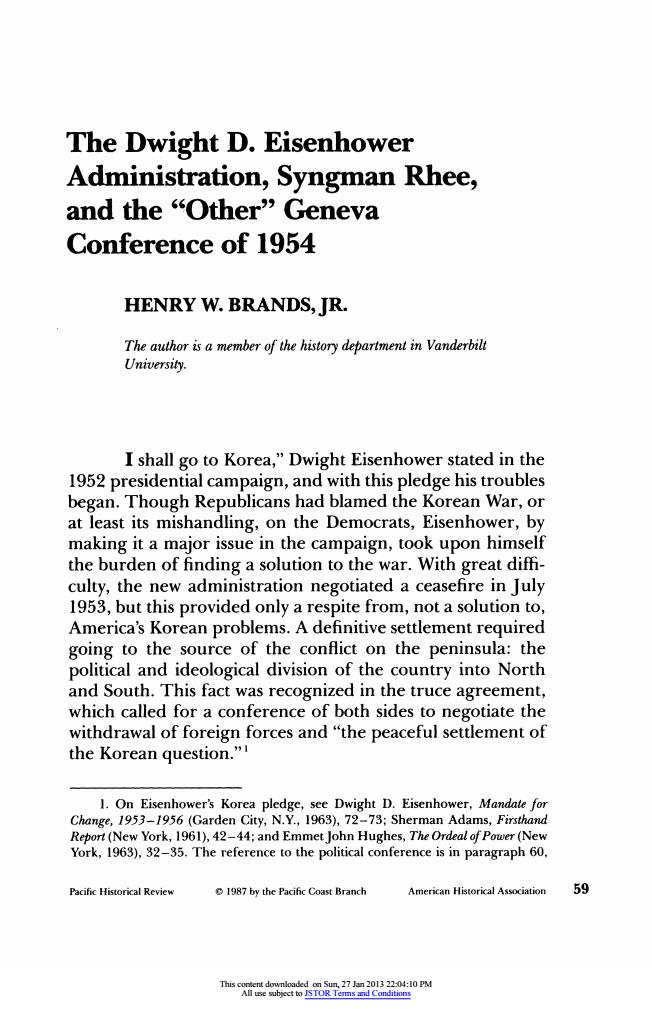正在加载图片...

The Dwight D.Eisenhower Administration,Syngman Rhee, and the“Other'Geneva Conference of 1954 HENRY W.BRANDS,JR. The author is a member of the history department in Vanderbilt University. I shall go to Korea,"Dwight Eisenhower stated in the 1952 presidential campaign,and with this pledge his troubles began.Though Republicans had blamed the Korean War,or at least its mishandling,on the Democrats,Eisenhower,by making it a major issue in the campaign,took upon himself the burden of finding a solution to the war.With great diffi- culty,the new administration negotiated a ceasefire in July 1953,but this provided only a respite from,not a solution to, America's Korean problems.A definitive settlement required going to the source of the conflict on the peninsula:the political and ideological division of the country into North and South.This fact was recognized in the truce agreement, which called for a conference of both sides to negotiate the withdrawal of foreign forces and"the peaceful settlement of the Korean question." 1.On Eisenhower's Korea pledge,see Dwight D.Eisenhower,Mandate for Change,1953-1956(Garden City,N.Y.,1963),72-73;Sherman Adams,Firsthand Report (New York,1961),42-44;and Emmet John Hughes,The Ordeal of Power (New York,1963),32-35.The reference to the political conference is in paragraph 60. Pacific Historical Review 1987 by the Pacific Coast Branch American Historical Association 59 This condent downloaded on Sun,27 Jan 2013 22:04:10 PM All use subpect to JSTOR Terms and ConditionsThe Dwight D. Eisenhower Administration, Syngman Rhee, and the "Other" Geneva Conference of 1954 HENRY W. BRANDS, JR. The author is a member of the history department in Vanderbilt University. I shall go to Korea," Dwight Eisenhower stated in the 1952 presidential campaign, and with this pledge his troubles began. Though Republicans had blamed the Korean War, or at least its mishandling, on the Democrats, Eisenhower, by making it a major issue in the campaign, took upon himself the burden of finding a solution to the war. With great difficulty, the new administration negotiated a ceasefire in July 1953, but this provided only a respite from, not a solution to, America's Korean problems. A definitive settlement required going to the source of the conflict on the peninsula: the political and ideological division of the country into North and South. This fact was recognized in the truce agreement, which called for a conference of both sides to negotiate the withdrawal of foreign forces and "the peaceful settlement of the Korean question."' 1. On Eisenhower's Korea pledge, see Dwight D. Eisenhower, Mandate for Change, 1953-1956 (Garden City, N.Y., 1963), 72-73; Sherman Adams, Firsthand Report (New York, 1961), 42-44; and EmmetJohn Hughes, The Ordeal of Power (New York, 1963), 32-35. The reference to the political conference is in paragraph 60, Pacific Historical Review ? 1987 by the Pacific Coast Branch American Historical Association 59 This content downloaded on Sun, 27 Jan 2013 22:04:10 PM All use subject to JSTOR Terms and Conditions